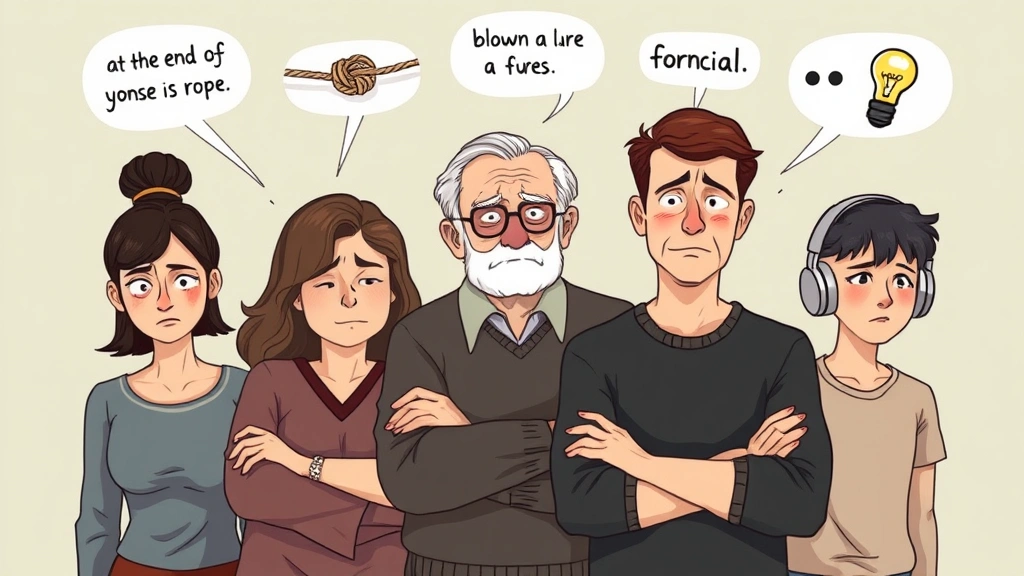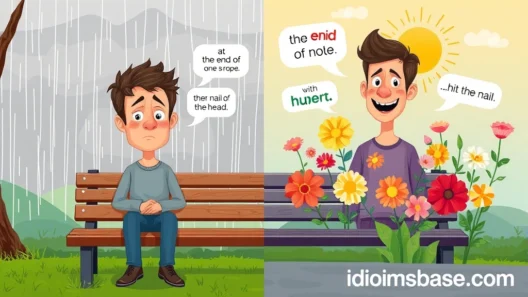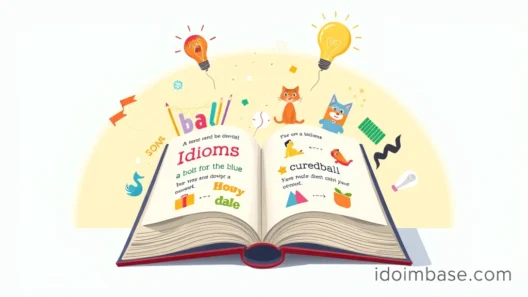Feeling a bit down in the dumps? Perhaps you're seeing red or hot under the collar? Emotions, especially the tricky ones like upset, are a universal part of the human experience. And just as varied as our feelings are the ways we express them. Enter the wonderful world of idioms! These colorful phrases add so much flavor and nuance to our language, allowing us to convey complex emotions with just a few well-chosen words.
Imagine trying to explain every subtle shade of annoyance, disappointment, or anger without these linguistic shortcuts. It would be a nightmare! Idioms aren't just quirky expressions; they're cultural touchstones, reflecting how societies have historically understood and communicated feelings. They offer a rich tapestry of imagery, from storms brewing to spirits sinking, painting vivid pictures of inner turmoil.
So, whether you're looking to better understand your own feelings, articulate them more effectively, or simply broaden your English vocabulary, diving into idioms for upset is a fantastic journey. Let's explore 25 of these fascinating phrases that capture the many facets of being upset. You'll be amazed at how much they enhance your communication!
Key Takeaways
- Idioms are powerful: They add depth and color to our language, allowing us to express complex emotions like upset in a concise and vivid way.
- Context is king: Understanding the context behind an idiom is crucial for using it correctly and interpreting its meaning.
- Boost your communication: Learning these idioms can significantly improve your ability to understand and express feelings in English.
- Universal appeal: While specific phrases vary, the human experience of feeling upset is universal, making these idioms relatable across cultures.
- Fun and engaging: Exploring idioms is a playful and engaging way to expand your vocabulary and cultural understanding.
The Colorful World of Upset: 25 Idioms Explained
Let's dive into our curated list of 25 idioms that perfectly capture the essence of being upset. Each one comes with a clear explanation and an example to help you grasp its meaning and use it confidently.
Common Idioms for General Upset
These idioms are versatile and can describe a range of negative emotional states, from mild annoyance to deep sadness.
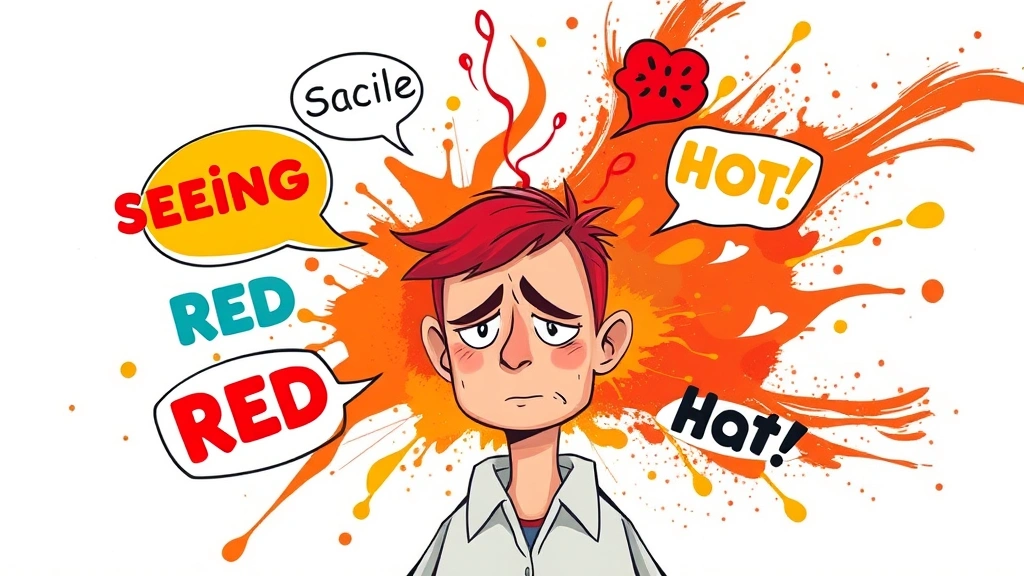
1. Down in the Dumps
To be "down in the dumps" means to be sad, depressed, or unhappy. It paints a picture of someone feeling low, as if they've been discarded into a pile of rubbish. It's a classic way to describe a general feeling of malaise.
- Example: After his favorite team lost the championship, John was down in the dumps for days.
2. Feeling Blue

This idiom is quite common and simply means to feel sad or melancholy. The color blue has long been associated with sadness in Western cultures, making this a very intuitive phrase.
- Example: The rainy weather always makes me feel blue and less energetic.
3. Under the Weather
While often used for physical illness, "under the weather" can also imply a general feeling of being unwell emotionally or slightly upset. It suggests a temporary state of not feeling quite right.
- Example: She's been a bit under the weather since the argument with her friend.
4. Out of Sorts
To be "out of sorts" means to be slightly unwell or unhappy; not feeling one's usual self. It's a mild form of upset, indicating discomfort or irritability.
- Example: He seemed a bit out of sorts this morning, probably didn't get enough sleep.
5. Have a Heavy Heart
This idiom means to feel sad or grieved. It evokes a physical sensation of emotional weight, as if one's heart is burdened by sorrow.
- Example: She left her hometown with a heavy heart, knowing she wouldn't be back for a long time.
Idioms for Anger and Frustration
When upset escalates to anger or intense frustration, these idioms come into play, often using vivid imagery of heat, color, or explosive energy.
6. See Red
To "see red" means to become extremely angry, often to the point of losing control. It suggests a sudden rush of blood or a blurring of vision due to intense rage.
- Example: When he realized his car had been scratched, he literally saw red.
7. Hot Under the Collar
This phrase describes someone who is very angry or embarrassed. The image is of someone's neck and face flushing with heat due to strong emotion.
- Example: The manager was hot under the collar when he found out about the missed deadline.
8. Blow a Fuse
To "blow a fuse" means to suddenly lose one's temper, similar to an electrical fuse breaking when overloaded. It implies a sudden, explosive outburst of anger.
- Example: When the computer crashed again, she blew a fuse and started shouting.
9. Bite One's Head Off
This idiom means to respond to someone with extreme anger, often disproportionately. It paints a picture of a vicious, verbal attack.
- Example: Don't ask him about it now; he's in a bad mood and might just bite your head off.
10. Get One's Knickers in a Twist (British English) / Get Bent Out of Shape (American English)
Both idioms mean to become overly agitated, upset, or angry about something, often minor. They describe an unnecessary level of distress.
- Example (British): It's just a spilled drink, don't get your knickers in a twist!
- Example (American): Why are you so bent out of shape over such a small mistake?
11. Have a Chip on One's Shoulder
This idiom describes someone who seems easily offended or who harbors a grudge, often due to a past injustice. The image is of someone literally carrying a burden of resentment.
- Example: He's always had a chip on his shoulder ever since he didn't get that promotion.
12. Rub Someone the Wrong Way
To "rub someone the wrong way" means to annoy or irritate them without intending to, often due to a clash of personalities or mannerisms. It's like stroking a pet's fur in the opposite direction.
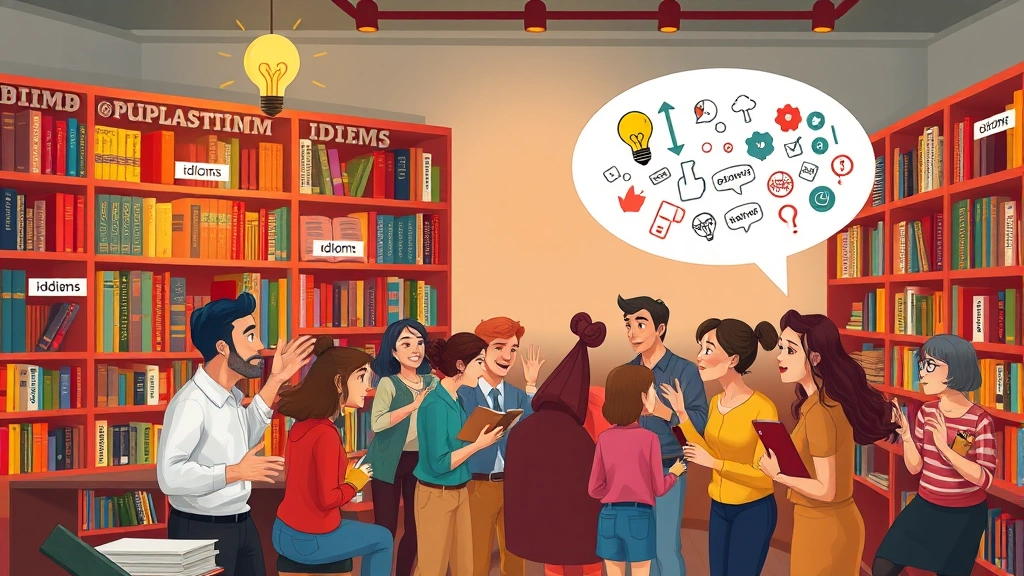
- Example: His sarcastic comments always seem to rub her the wrong way.
Idioms for Disappointment and Despair
Sometimes, upset stems from dashed hopes or a feeling of hopelessness. These idioms capture that particular brand of emotional pain.

13. Have One's Heart Sink
This idiom means to feel a sudden sense of disappointment, dread, or despair. It's a vivid image of one's spirit or hope physically dropping.
- Example: My heart sank when I saw the rejection letter from the university.
14. A Bitter Pill to Swallow
This phrase refers to an unpleasant or disappointing fact or situation that must be accepted. It's something difficult or painful to endure.
- Example: Losing the contract was a bitter pill to swallow for the whole team.
15. Dash One's Hopes
To "dash one's hopes" means to destroy someone's hopes or expectations. It implies a sudden and complete shattering of anticipation.
- Example: The news of the cancellation dashed all our hopes of going on vacation.
16. The Last Straw
This idiom refers to the final annoyance or difficulty that makes one lose patience or control. It's the breaking point, often following a series of smaller issues. Derived from "the straw that broke the camel's back."
- Example: When he insulted my family, that was the last straw; I walked out.
17. Down in the Mouth
Similar to "down in the dumps," this idiom describes someone who looks unhappy or dejected, often with a sad facial expression (mouth turned downwards).
- Example: After failing the exam, she was looking quite down in the mouth.
Idioms for Being Annoyed or Irritated
These idioms describe milder forms of upset, focusing on irritation or being bothered by something.
18. Get on One's Nerves
To "get on one's nerves" means to annoy or irritate someone greatly. It suggests a persistent, bothersome presence or action.
- Example: That constant tapping sound is really getting on my nerves.
19. Drive Someone Up the Wall
This idiom means to annoy or irritate someone to the point of extreme frustration or madness. It suggests a feeling of being trapped or driven crazy.
- Example: His endless complaining is driving me up the wall.
20. Like a Bear with a Sore Head
This describes someone who is in a very bad temper, grumpy, and easily agitated. The imagery is of a wounded, irritable animal.
- Example: Don't bother him this morning; he's like a bear with a sore head.
21. Have a Bee in One's Bonnet
To "have a bee in one's bonnet" means to be obsessed or preoccupied with a particular idea or grievance, often to the point of irritation for others.
- Example: She's got a bee in her bonnet about climate change and brings it up in every conversation.
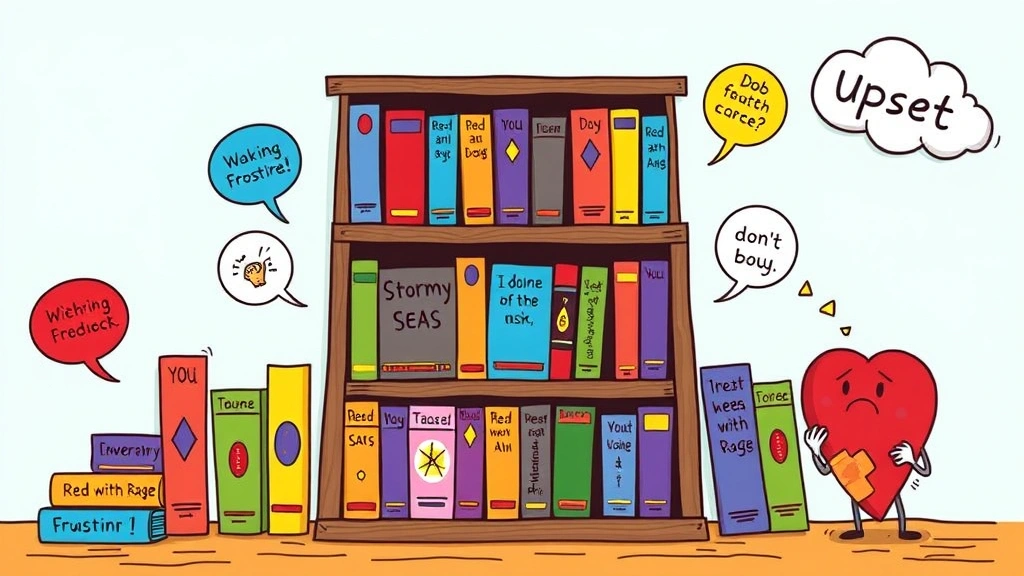
Idioms for Being Worried or Anxious
Upset can also manifest as worry or anxiety. These idioms highlight that aspect.

22. Have Butterflies in One's Stomach
While often associated with excitement, "having butterflies in one's stomach" can also mean feeling nervous or anxious, especially before a challenging event.
- Example: Before her big presentation, she had butterflies in her stomach.
23. On Edge
To be "on edge" means to be tense, nervous, or irritable. It suggests a state of heightened sensitivity and readiness for something to go wrong.
- Example: The constant deadlines have left everyone on edge.
24. At One's Wit's End
This idiom means to be so worried, confused, or frustrated that one doesn't know what to do next. It signifies a complete loss of ideas or solutions.
- Example: I'm at my wit's end trying to figure out how to fix this problem.
25. Lose Sleep Over Something
To "lose sleep over something" means to worry excessively about a situation to the point where it affects one's ability to sleep.
- Example: Don't lose sleep over that small mistake; it's not the end of the world.
Why Use Idioms for Upset?
You might be wondering, "Why bother with these quirky phrases when I can just say 'I'm sad' or 'I'm angry'?" That's a fantastic question, and the answer lies in the richness and specificity idioms bring to our language.
Adding Nuance and Depth
Think about it: "I'm upset" is quite generic. But saying "I'm down in the dumps" immediately conveys a sense of prolonged sadness, almost a melancholic quietness. If you say someone is "seeing red," you instantly understand they're not just annoyed, but furiously angry, perhaps on the verge of an outburst. Idioms allow us to paint more detailed emotional landscapes.
Cultural Connection and Relatability
Idioms are deeply embedded in culture. When you use them correctly, you're not just speaking English; you're speaking English like a native. This creates a stronger connection with your audience and shows a deeper understanding of the language's subtleties. It's like a secret handshake for fluent speakers! For a global audience, understanding these nuances is key to effective cross-cultural communication.
Vivid Imagery and Memorability
Many idioms for upset use powerful metaphors. "Blowing a fuse" immediately conjures an image of something breaking down under pressure. "A bitter pill to swallow" makes you almost taste the unpleasantness. This vivid imagery makes your communication more engaging, memorable, and impactful. It helps your listener or reader truly feel what you're trying to convey.
Conciseness and Efficiency
Why use a whole sentence when a few words can do the trick? Idioms are linguistic shortcuts. Instead of explaining a long-standing grievance, simply saying someone has "a chip on their shoulder" gets the message across quickly and efficiently.
Frequently Asked Questions
Understanding idioms can sometimes be tricky, so let's address some common questions you might have.
Q1: What is the difference between an idiom and a proverb?
A1: While both are figurative expressions, an idiom is a phrase where the meaning isn't obvious from the individual words (e.g., "kick the bucket" doesn't literally mean to kick a bucket, it means to die). A proverb, on the other hand, is a short, well-known saying that offers advice or states a general truth (e.g., "Actions speak louder than words"). Idioms are about expressing ideas or feelings; proverbs are about wisdom.
Q2: How can I learn and remember these idioms effectively?
A2: The best way is through active engagement! Don't just memorize lists. Try these strategies:
- Contextual learning: See how they are used in books, movies, and conversations.
- Practice using them: Try to incorporate one new idiom into your conversations or writing each week.
- Flashcards with examples: Write the idiom on one side and its meaning and an example sentence on the other.
- Visual associations: Create a mental image for each idiom (e.g., a person literally seeing red for "see red").
- Categorize them: Group them by emotion (anger, sadness, worry) as we did in this article.
Q3: Are idioms for upset universal across all English-speaking countries?
A3: Most of the idioms listed here are widely understood across major English-speaking countries (e.g., US, UK, Canada, Australia). However, some might be more common in one region than another. For instance, "get one's knickers in a twist" is very British, while "get bent out of shape" is more American. When in doubt, stick to the more universally recognized ones, or be aware of your audience.
Q4: Can using too many idioms make my writing or speaking confusing?
A4: Yes, absolutely! While idioms add color, overusing them can make your language sound unnatural, forced, or even confusing, especially for non-native speakers or those unfamiliar with specific idioms. The key is balance. Use them strategically to enhance your message, not to overwhelm it. Think of them as spices – a little adds flavor, too much ruins the dish.
Q5: How do idioms evolve, and why do some disappear?
A5: Idioms evolve with language and culture. They often originate from specific historical events, occupations, or common experiences. For example, many nautical idioms come from sailing. They disappear when the context that gave them meaning is no longer relevant or understood (e.g., old farming or industrial terms might fade). Language is dynamic, and idioms reflect that constant change, with new ones forming and old ones fading over time.
Conclusion
Phew, what a journey through the emotional landscape of English idioms! We've explored 25 fantastic phrases that help us articulate the myriad ways we can feel upset, from the quiet melancholy of being down in the dumps to the explosive fury of seeing red. You've seen how these expressions aren't just random words; they're vivid snapshots of human experience, adding depth, nuance, and a touch of cultural flair to our communication.
Understanding and using these idioms effectively isn't just about expanding your vocabulary; it's about becoming a more expressive and empathetic communicator. It allows you to truly grasp the subtle feelings others convey and articulate your own with greater precision and impact. So, the next time you're feeling a particular shade of upset, don't just say "I'm upset." Dig into your newfound linguistic toolbox and pick the perfect idiom to capture your mood.
Which idiom resonated most with you today? Are there any others you use to describe feeling upset? Share your thoughts and let's keep the conversation going! Your insights are always welcome.


